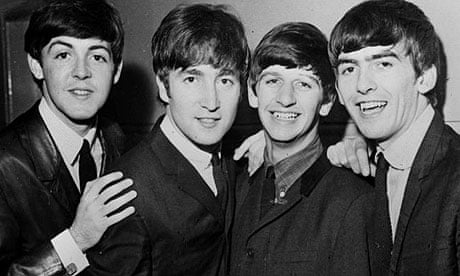The following correction was printed in the Guardian's Corrections and clarifications column, Monday 7 September 2009
In the article below we cited the song There's a Place as being on the Beatles second album, With the Beatles. It was actually on their first album, Please Please Me.
Something strange happened to the public perception of the Beatles in the 90s. Britpop's open worship finally elevated them to an utterly unimpeachable position – it's impossible to imagine any artist today daring to be photographed defacing a Beatles sleeve, as Johnny Rotten once was – but it promoted a foreshortened version of the Fab Four, one whose career begins with Rubber Soul, or at a push, 1965's Help! These days, their first four albums are invariably vastly outsold by those that came later, when drugs and sitars and the fear of encountering an unexpected vocal contribution from Yoko Ono had caused their more conservative fans to flee: "The Beatles have got awfully strange these days," as famous Windsor-based rock critic Queen Elizabeth II is alleged to have protested in 1967. As a result, the Beatles enjoyed by HRH – mop-topped and besuited, packaged for family consumption – appear to have ended up tainted by a certain naffness in modern eyes.
But at the time, they were clearly anything but. They may be more sophisticated, varied and vastly more influential on current music, but The White Album and Revolver didn't change the world in the way Please Please Me and With the Beatles did. If you believe the late Ian MacDonald's peerless book Revolution in the Head, the latter albums signalled a social change "away from the old class-based order of deference to 'elders and betters' to the frank and fearless energy of the younger generation". Set against that, inspiring Be Here Now and Beetlebum seems pretty small beer.
Nevertheless, if you weren't around in 1963, it's sometimes been difficult to work out precisely why the music contained on the early Beatles albums had such impact. If you grew up in the 70s or later, you invariably heard them in that terrible early-60s brand of stereo, with the instruments bunged in one speaker and the vocals in the other, as if a blustery old man with a bowler hat had covertly crept into Abbey Road and attempted to sabotage the coming youth revolution by making its harbingers seem as pathetic as possible. The 1987 Beatles CDs restored the first four albums to mono, but they still sounded brittle and tinny, as if they'd have difficulty changing a lightbulb, let alone the social order of Britain.
This may be where The Beatles in Mono comes into its own. At first glance, it looks an extravagant frippery: a £240 11-CD box set, featuring perfect miniature reproductions of albums pristinely remastered in a sonic format rendered obsolete almost half a century ago. But until 1969, the Beatles were disinterested in stereo: they oversaw the mono mixes of their albums, then left the rest to George Martin. The box set can thus proudly claim to offer "the closest you can get to hearing the authentic sound of the Beatles". On the later albums, that amounts to a handful of cosmetic differences: if it's striking to hear Lucy in the Sky With Diamonds with added psychedelic phasing effects, it doesn't radically alter your perception of the song. The early albums, however, are transformed.
The Beatles sound taut, vital and surprisingly brutal. Plenty of 60s British bands covered material by black US artists: they tended to bowdlerise it, but the Beatles made it more visceral. There's something authentically deranged about their covers of Twist and Shout and Money. Smokey Robinson's fabulous You Really Got a Hold On Me has its emotional compass shifted from melancholy to torment, with electrifying results.
If their debut suffers from a deficit of great original material, that only makes the subsequent qualitative leaps all the more astonishing. Within a matter of months, they had gone from the schmaltz of PS I Love You and Ask Me Why to the accomplishment and forcefulness of With the Beatles' There's a Place and Not a Second Time. Equally striking is how early and strongly the Beatles' respective personalities foregrounded themselves. The kind of anguish that was Lennon's stock-in-trade from Help! through to I Want You (She's So Heavy) is evident from the start: literally his first lead vocal on a Beatles album is "the world is treating me bad – misery". With the Beatles' Don't Bother Me is the first in a long line of George Harrison songs in which people were advised to bugger off.
By the time of 1964's Beatles for Sale, they're confidently pushing at the boundaries of their chirpy image. It opens with No Reply, I'm a Loser and Baby's in Black: utterly downcast, emotionally raw. Listening to them here, they sound not like a relic from a forgotten era of the 60s, but as thrilling and daring as they must have once done blaring from a Dansette in a suburban bedroom. You'd have to have cloth ears not to understand what the fuss was about.
